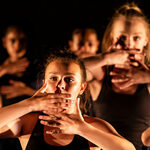Tower Hamlets: Local History
Less well known stories of community action for justice and human rights in Tower Hamlets.
A guide to primary and secondary resources for educators
Themes include: solidarity across communities; the impact of grassroots action; and refusals to be bystanders to injustice. Responsibility remains with educators to ensure that materials are age appropriate for their students.
Please download our free materials with links to further research.
![]()
Grassroots action against injustice: Women Unite Against Racism
In response to the election of a British National Party councillor in Tower Hamlets in 1993, Julie Begum and others set up a collective called Women Unite Against Racism (WUAR). They helped defeat the BNP candidate by escorting women to polling stations, and empowering them to be part of the anti-racist struggle in Tower Hamlets.
![]()
Solidarity across communities: tailors and dockers
In 1912, when West End tailors went on strike over pay and conditions, 8,000 mainly Jewish tailors in the East End joined them. Despite terrible hardship they held out, finally securing their demands. The East End tailors had held joint strike meetings with dockers and when the unsuccessful dock strike was in its last few weeks, over 300 dockers’ children were housed by East End Jewish families.
![]()
Refusing to be bystanders to injustice: refugees then and now.
Tower Hamlets has a long history of receiving migrants fleeing war and persecution. In 1914 Tower Hamlets residents held fundraising drives for Belgian refugees, and 70 refugee women were cared for at the Harley College in Bow Road. From 1938 to 1940 trains of Jewish children fleeing Nazi Germany arrived at Liverpool Street Station on the Kindertransport. In 2016 refugees are still in the news, and Lord Alf Dubs – one of those children – sponsored an amendment to the Immigration Act so that unaccompanied child refugees could be brought from Europe to Britain.
![]()
The impact of grassroots action: Nellie Cressall and the Poplar Rent Strike 1921
In 1921 thirty Poplar Labour councillors – including six women – were imprisoned after they refused to collect tax as part of a London rates system that they felt hit the poorest. Nellie Cressall, six months pregnant, was one of those. 15,000 people assembled outside Holloway Prison after the women’s first night there, to cheer them. Despite being extremely ill in prison, and being given food that was often rotten and inedible, Nellie refused to leave before her colleagues.
![]()
Arts activism: Cable Street Mural
In 1936 local people united to stop fascists marching into the East End in what became known as the Battle of Cable Street. Forty years later artist Dave Binnington started work on a commemorative mural but it was defaced in 1982, with slogans including ‘Rights for Whites’. The mural was finally completed in 1983 by three artists, Desmond Rochfort, Ray Walker and Paul Butler, and restored in 2011. It is a landmark and source of pride for anti-fascist campaigners.
![]()
Refusing to be bystanders to injustice: LGBT rising – the founding of Stonewall
In 1988 Margaret Thatcher’s government banned the alleged ‘promotion of homosexuality in schools’ in Section 28 of the Local Government Act. In response, a group of well-known people in the media established the LGBT group Stonewall, whose first meeting took place at actor Sir Ian McKellen’s home in Tower Hamlets. Stonewall would be a major part of the repeal of Section 28 in 2003, and secured other significant campaigning victories for the LGBT community.
![]()
The impact of grassroots action: Spitalfields City Farm
The farm was founded in 1978, when volunteers converted wasteland into allotments after original allotment land was used by developers. The farm also features gardens and animals, and works closely with the local community to provide access to nature in one of London’s poorest and most densely populated areas. It is well known for its annual Goat Race and also hosts the Coriander Club, a gardening and cookery club for Bengali women founded in 1999 by Lutfun Hussain.
![]()
Arts activism: Naseem Khan
From 2004 the Friends of Arnold Circus worked to renovate the bandstand and garden at the centre of the historic Boundary Estate in Tower Hamlets. Naseem Khan, its Chair, raised funds and organised several art projects, including the creation in 2008 of the Bagaan Textile (Garden Textile) made by the Women’s Group at St Hilda’s East Community Centre.
![]()
(Research for Journey to Justice by Bethan Rigby with thanks to Julie Begum, Duncan Campbell, Stefan Dickers, Esther Freeman, Sarah Jackson Perdita Jones, David Rosenberg, Mary Spyrou, Louise Swan, Nadia Valman, Mhairi Weir and Andrew Whitehead.)





